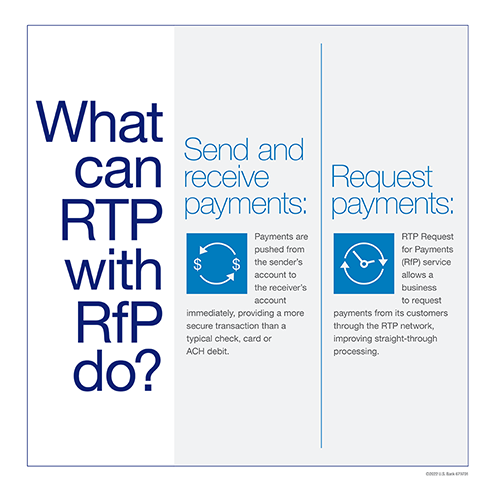Here are four ways RfP changes C2B bill pay:
1. See faster delivery and settlement
With an immediate bill delivery system, people can act quickly on both sides of a bill. As soon as the biller initiates the request, the consumer can view it through their bank’s bill payment experience. Within seconds, the consumer can take care of the payment and get back to what they’re doing. Or they can future date to pay on the due date.
The settlement is also immediate on both sides. Consumers can make last minute or emergency payments to avoid late charges or service disruptions. Sometimes in online bill pay systems, even though the payment seems instant, the settlement can take time and include paper processes.
2. Decrease returned items and count on good funds
A real-time payment is a completely closed loop transaction, which means there are no third parties involved. On this network, a payment is good funds and irrevocable, which can eliminate returned items and overdrafts related to bill payments.
From a childcare payment to a utility bill, a lot of customers are choosing to enable reoccurring ACH payments. This option increases the risk of returned items if the consumer account doesn’t have the funds to cover the transaction. If an ACH payment returns, you can send a second request as an RfP through the RTP network using the information you already have, and the customer can make sure to have funds in the account before they send the payment back.
3. Increase visibility and transparency
The real-time payment network is trusted and secure. All the information related to a bill and the resulting payment is available on the network with data-rich messaging. This allows visibility into where the payment is in the process, and it’s backed by a trusted financial institution.
The elephant in the room for payments is all the data. RfP standardizes the information, so the payment details are normalized, applied and transparent in real-time, without relying on the customer to input remittance detail. If ‘matching’ is a recognizable part of a business’s strategy, this process eliminates that need, saving time, energy and resources.
4. Improve the customer experience
RfP ensures a simplified customer experience, something everyone expects as the world goes more instant. Imagine the impact for customers used to receiving paper bills, then mailing a paper check or calling a company with a credit card number. Instead, the customer can receive notification of a bill in their online banking app and simply click a button to immediately complete the payment.
The enablement of RfP within consumer banking applications provides a different user experience than current online bank bill pay. The biggest advantage for a consumer is they know when the banking application will apply the payment, so they know the real state of the payment. RfP gives speed and certainty.
Financial institutions are also creating unique ways to connect customers to digital payments, which allows consumers to choose how they pay and offers a whole new level of convenience because there’s the ability to choose what works in that moment. The way someone pays might not always be the same based on the circumstances of the transaction.





































